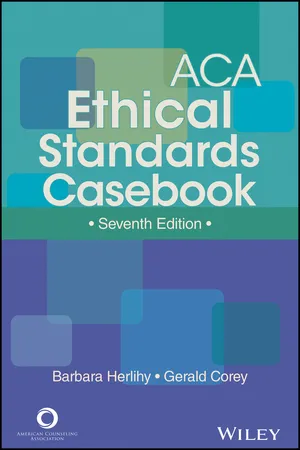
- English
- ePUB (mobile friendly)
- Available on iOS & Android
ACA Ethical Standards Casebook
About this book
"This practical guide is ideal both for teaching future members of the profession about their ethical responsibilities and for reinforcing ethical competence among current professionals. We strongly recommend this book."
Jeffrey E. Barnett, PsyD, ABPP W. Brad Johnson, PhD
Loyola University Maryland United States Naval Academy
Coauthors, Ethics Desk Reference for Counselors, 2nd Edition
"Herlihy and Corey's text boosts the reader's ethical understanding leaps and bounds above mere reading of the ACA Code of Ethics. With multifaceted case study examples and an integrated approach to tackling ethical dilemmas, this book is a must-read for students, counselors, counselor educators, and supervisors."
Shannon Hodges, PhD Michael Knight
Niagara University Graduate Student, Niagara University
ACA Ethics Revision Task Force Member
The seventh edition of this top-selling text provides a comprehensive resource for understanding the 2014 ACA Code of Ethics and applying its principles to daily practice. Each individual standard of the Code is presented with an explanatory case vignette, and a Study and Discussion Guide is provided at the beginning of each major section of the Code to stimulate thought and discussion. Common ethical concerns, with instructive case studies, are then explored in individual chapters. Topics addressed include client rights and informed consent, social justice and counseling across cultures, confidentiality, counselor competence, working with minor clients, managing boundaries, client harm to self or others, counselor training and supervision, research and publication, and the intersection of ethics and law. Chapters new to this edition examine managing value conflicts and the issues surrounding new technology, social media, and online counseling. The Casebook also contains an Inventory of Attitudes and Beliefs About Ethical Issues to assist counselors in developing a personal ethical stance.
This eighth edition provides a current and comprehensive discussion of counselors' legal and ethical responsibilities, an examination of state and federal laws as they relate to practice, and helpful risk management strategies. Attorney Nancy Wheeler and Burt Bertram, a private practitioner and counselor educator, offer real-world practical tips to help navigate professional risks while providing competent clinical care. New or updated topics include matters surrounding informed consent, current case law on duty to warn/protect and issues surrounding suicide in college/university settings, electronic records and ransomware concerns, and updates on state licensure board data regarding boundary violations. The authors' legal and ethical decision-making model will assist counselors and students with processing their own legal and ethical dilemmas, and the ACA Code of Ethics is included as a handy reference. *Requests for digital versions from ACA can be found on www.wiley.com *To purchase print copies, please visit the ACA website.
*Reproduction requests for material from books published by ACA should be directed [email protected]
Tools to learn more effectively

Saving Books

Keyword Search

Annotating Text

Listen to it instead
Information
Part I
Introduction
Introduction
- Why does the counseling profession need a code of ethics? What purposes does it serve?
- Who created the ACA Code of Ethics?
- Why does the Code change periodically? How often is it revised? Who makes the revisions?
- How can an ethical dilemma best be resolved? What is the best process for ethical decision making?
- How is the ACA Code of Ethics enforced?
Evolution of the ACA Ethical Standards and the Casebook
Table of contents
- Cover
- Title Page
- Copyright
- Dedication
- Acknowledgments
- About the Authors
- About the Contributors
- Making the Best Use of the Casebook
- Part I: Introduction
- Part II: ACA Code of Ethics With Illustrative Vignettes
- Part III: Issues and Case Studies
- Highlights of Ethical Practice
- References
- Index
- Technical Support
- End User License Agreement
Frequently asked questions
- Essential is ideal for learners and professionals who enjoy exploring a wide range of subjects. Access the Essential Library with 800,000+ trusted titles and best-sellers across business, personal growth, and the humanities. Includes unlimited reading time and Standard Read Aloud voice.
- Complete: Perfect for advanced learners and researchers needing full, unrestricted access. Unlock 1.4M+ books across hundreds of subjects, including academic and specialized titles. The Complete Plan also includes advanced features like Premium Read Aloud and Research Assistant.
Please note we cannot support devices running on iOS 13 and Android 7 or earlier. Learn more about using the app